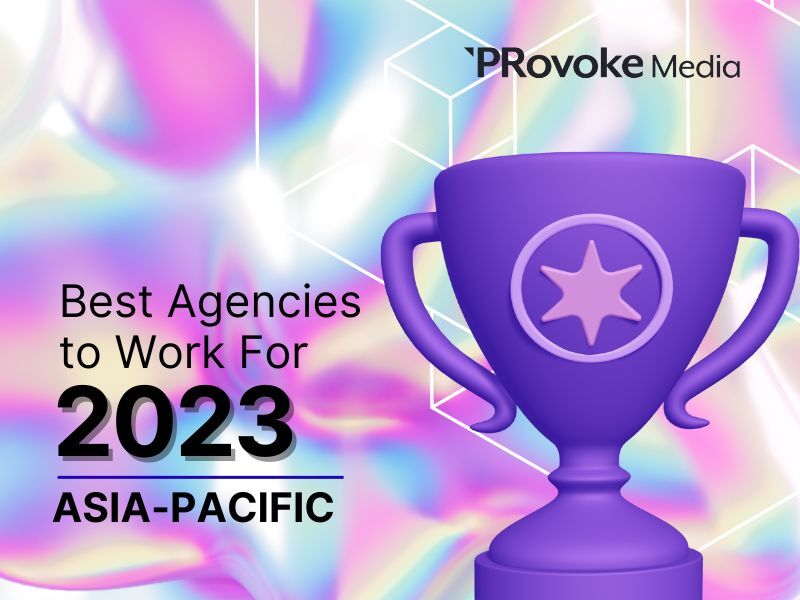Paul Holmes 18 Dec 2023 // 6:43AM GMT

Public relations agency employees in the Asia-Pacific region are less interested than their counterparts in North America or Europe in work-life balance (although perhaps they just have lower expectations), but they do care more about their workplace environment and place equal emphasis on the quality of the people they work more closely with, according to data gathered during our Best Agencies to Work For research earlier this year.
What they have in common with PR agency employees around the world is that they say financial compensation is less important to them than “softer” issues such as culture. Financial compensation ranked sixth in importance out of 11 workplace attributes in Asia-Pacific, compared to third in North America and fifth in Europe.
Workplace culture and people and co-workers are the two most important issues, but the emphasis on the quality of agency leadership also stands out: it was the third most important factor in job satisfaction in APAC, while ranking only seventh in North America and eighth in EMEA.
Also notable was the low priority given to diversity and inclusion in Asia-Pacific region. While it ranked eighth and ninth in North America and EMEA respectively, it was dead last among 11 characteristics in Asia-Pacific — perhaps reflecting different definitions of diversity in the Asia-Pacific region.
It may also be that Asia-Pacific professionals believe their agencies have successfully addressed diversity and inclusion efforts, Asked to agree or disagree with 42 different statements about their agency, the four highest scores went to question related to diversity:
• My agency is a welcoming workplace for people of all sexual identities 9.50
• My agency does a good job of empowering women in leadership positions 9.46
• My agency values ethnic and racial diversity 9.41
• There is no discrimination of any kind at my agency 9.31
About one in four (41%) of respondents who chose to provide information identified as East Asian, with another 27% identifying as Southwest Asian, about 12% identifying as South Asian, and another 11% identifying as White—all of which suggests a broader ethnic mix than other regions, perhaps because the Asia-Pacific includes markets as diverse as India, China, Japan and Southeast Asia.
The answers to these questions did not differ somewhat between different ethnic groups: when asked whether “There is no discrimination of any kind at my agency,” South Asia respondents were most likely to agree (9.8), followed by White (9.53) and Southeast Asia (9.51) respondents, with those identifying as East Asian (9.34) evincing the lowest level of agreement. However, this may also reflect the homogenous nature of agency staff in such markets as India, mainland China, Japan and Korea.
Questions related to ethics also scored high marks. Employees ranked “my firm deals ethically with clients,” “My firm deals ethically with employees,” and “My firm has the integrity to turn down assignments it considers unethical” among the top 10.
Perhaps more concerning, given the importance of workplace culture and people and co-workers, “I like the people I work most closely with” was number nine out of 42 factors in Asia-Pacific, compared to number five in North America and number two in EMEA (though the overall score of 9.1 in APAC was not hugely different from 9.2 in other regions).
Not surprisingly, issues related to financial and other compensation were among those on which employees expressed the highest levels of dissatisfaction. “I am happy with my financial compensation,” drew the least happy response in APAC, with a score of 7.9, as it did in North America and EMEA. There was similar unhappiness about healthcare AND other benefits, and with the statement that “Overall, my compensation and benefits are fair compared to other agencies.”
Other areas of concern related to “long hours and undue stress”—another issue where agencies appear to be falling short globally—and “My agency does a good job of retaining good people.”
One final difference between the Asia-Pacific region and other markets where this research is conducted concerns the profession’s gender issue.
In North America, for example, the proportion of women declines quite sharply by age: at 26 or younger, the agency business is 84.8% female; from age 27-33 it is still 82.8% female; by 34-40 it has declined slightly to 77.6%; at age 41-47, it is 66.1% female; at 48-54, women make up 60.1% of the agency workforce, By age 55 or over, women make up just 53.8% of agency employees.
In APAC the decline is not nearly as sharp. At entry level, age 18-24, women accounted for 76^ of respondents; at age 25-34 it was 74.8%; at 35-44 it was 72.9%; at 45-54 it was still 70.1%. Even in the highest age group, over 55, women continued to account for 56.2% of responses (albeit from a very small sample size).



































.jpg)















